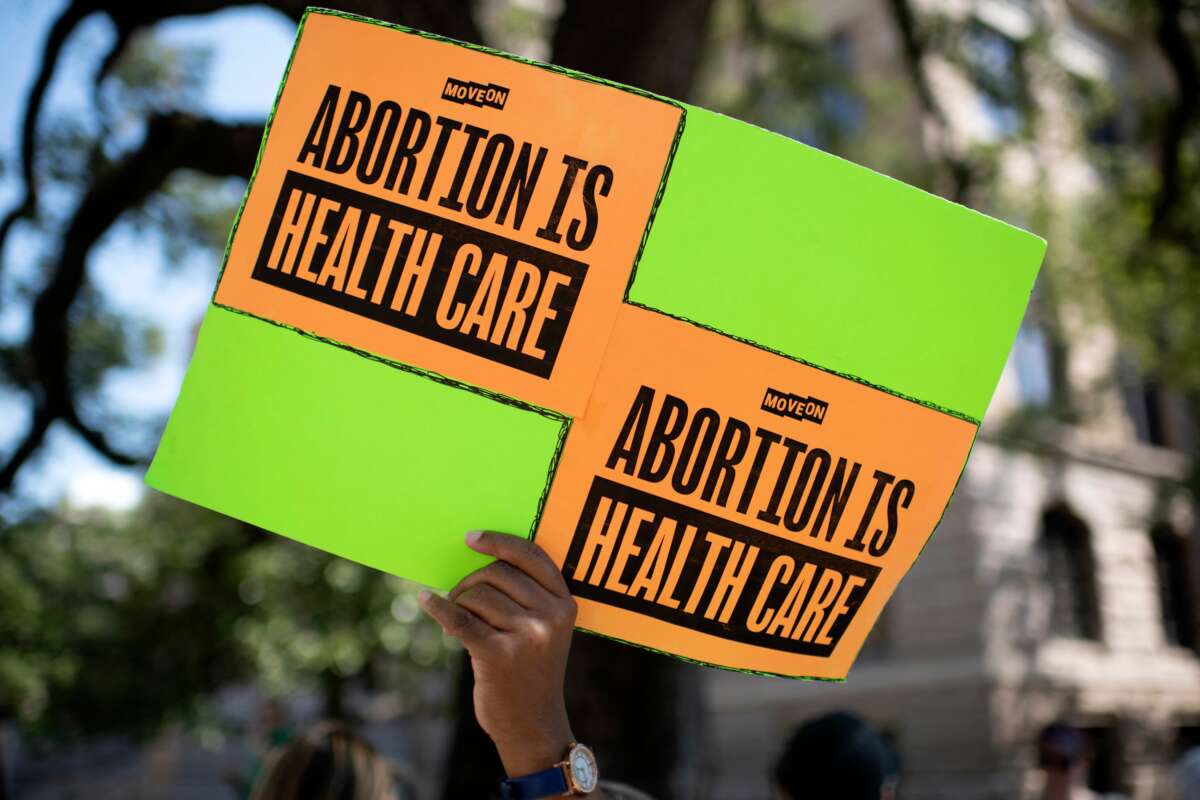Honest, paywall-free news is rare. Please support our boldly independent journalism with a donation of any size.
Mounting news reports since the U.S. Supreme Court overturned Roe v. Wade last year have detailed the experiences of pregnant people who have been denied lifesaving abortion care, and in the case of one woman in Oklahoma last month, the state’s abortion ban effectively barred her from receiving cancer treatment.
Jaci Statton, a 25-year-old mother of three, experienced heavy bleeding in February after feeling nauseous, dizzy, and weak for several weeks. Her doctor informed her that she had a molar pregnancy, in which a fertilized egg has too many chromosomes that keep it from ever developing into a viable fetus.
Statton’s molar pregnancy was among 15% of cases which become cancerous, putting her at risk for more hemorrhaging, kidney and liver failure, stroke — and potentially death.
Over the course of a week, though, Statton and her husband were told by doctors at three different hospitals that she could not get the treatment recognized by doctors as the standard of care for molar pregnancies: a dilation and curettage or D&C, which is a surgical abortion procedure that clears pregnancy tissue from the uterus.
At the last hospital she went to before deciding to get care three hours away at an abortion clinic in Kansas, Statton was told to wait in the parking lot until her symptoms became worse than the heavy bleeding and illness she had already experienced.
“They were very sincere; they weren’t trying to be mean,” Statton told NPR. “They said, ‘The best we can tell you to do is sit in the parking lot, and if anything else happens, we will be ready to help you. But we cannot touch you unless you are crashing in front of us or your blood pressure goes so high that you are fixing to have a heart attack.'”
Statton’s experience illustrates “what ‘pro-life’ laws look like on the ground,” said MSNBC news anchor Chris Hayes.
Doctors were reluctant to treat Statton due to three separate anti-abortion laws that are in effect in Oklahoma: The Oklahoma Heartbeat Act, which prohibits physicians from ‘knowingly’ providing an abortion after ‘detect[ing] a fetal heartbeat’ and allows any individual to bring a civil action against anyone who provides care or helps someone obtain it, and which contains an exception for “medical emergencies” and to “save the life” of the pregnant person; H.B. 4327, which applies to pregnancies from the moment of fertilization; and a ban dating back to 1910, which went into effect on June 24, 2022 as soon as Roe v. Wade was overturned and prohibits abortion at any point in pregnancy.
Statton’s case was reported by NPR as Physicians for Human Rights (PHR), the Center for Reproductive Rights, and Oklahoma Call for Reproductive Justice published research showing that hospitals across Oklahoma are hesitant to provide abortion care for people facing a medical emergency, even though the state’s abortion ban contains an exception for such cases.
The groups had several women call 37 hospitals across the state, saying they were pregnant and wanted to know the hospitals’ policies for providing abortion care in the case of complications or a medical emergency.
At one hospital, a staff member consulted with a doctor before telling the caller, “Nowhere in the state of Oklahoma can you get an abortion for any reason,” despite the exceptions.
Three hospitals said they would “just never provide abortions,” Dr. Michele Heisler, a professor at the University of Michigan and medical director of PHR, told NPR. Four facilities said they had an approval process in place to provide an abortion that was deemed “medically necessary,” and 14 hospitals “provided unclear and/or incomplete answers about whether doctors require approval to perform a medically necessary abortion.”
“One representative, for example, claimed that doctors at that hospital are not allowed to perform certain procedures for ‘ethical reasons,’ but would not clarify what those procedures or ethical concerns are,” the report reads.
Heisler told NPR that “one of the most frightening statements, which was at one of the hospitals, the person was trying to be reassuring and she said, ‘Oh, well, you know, in the case of a medical emergency, we would try to use the woman’s body as an incubator to just try to keep the pregnancy going as long as possible.'”
The survey results “reflect how Oklahoma’s abortion bans threaten the health and well-being of pregnant people and violate their human rights,” said PHR. “These violations include individuals’ rights to life, health, equality, information, freedom from torture and ill-treatment, and to exercise reproductive autonomy.”
“These findings,” the group added, “further affirm what has been recognized by the World Health Organization: that the criminalization and penalization of abortion care — even with an exception for medical necessity — is fundamentally inconsistent with evidence-based, ethical, and patient-centered healthcare.”
Along with Statton, women in Texas, Louisiana, and Florida have shared their stories in recent months about how abortion ban “exceptions” have placed their lives in peril as doctors and hospital legal teams assessed whether they were facing a grave enough medical emergency to warrant providing care.
Media that fights fascism
Truthout is funded almost entirely by readers — that’s why we can speak truth to power and cut against the mainstream narrative. But independent journalists at Truthout face mounting political repression under Trump.
We rely on your support to survive McCarthyist censorship. Please make a tax-deductible one-time or monthly donation.
